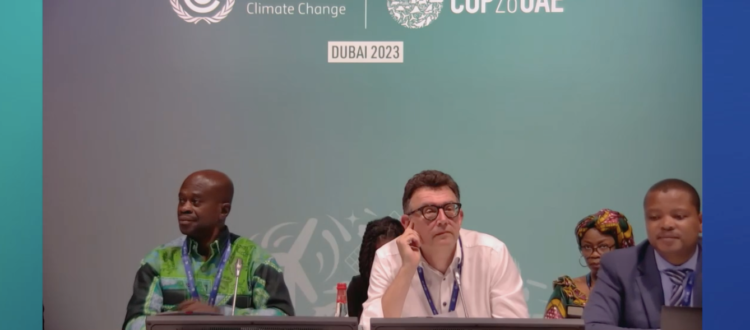ADAPTATION: FIRST CONSULTATIONS STARTING AT COP28
In these first days of COP28, a considerable amount of attention is focused on the topic of adaptation. After the intermediate meetings in Bonn, which had proposed drafts with many details still to be agreed upon, informal meetings have started to try and obtain a definitive draft.
The discussions were organizational rather than practical. One by one, the countries expressed their opinion on the draft written in June, and, in the end, they all agreed on how important it is to get more time to be able to scrutinize all the material and discuss it properly, point by point.
This has certainly led to an extension of time and has fueled a feeling of urgency.
The urgency, however, is not only to obtain a draft that is suitable for everyone, but also to adopt as soon as possible the practices of adaptation to climate change, which are putting entire nations and communities to the test. Only around 40 countries have so far delivered a national climate change adaptation plan. Of these, two are located in Europe while the others belong to the Global South, which is the area most affected by extreme climate events.
During the first session of the National Adaptation Plan (NAP), indeed, there were many proposals for modifications to the Bonn draft: this practically doubled the discussion points, which went from 13 to 25. One of the key added points is the one that calls for taking into account the local knowledge and science of indigenous communities when formulating and implementing NAPs. As a matter of fact, indigenous people are among the holders of great natural knowledge and keep around 80% of biodiversity healthy. Relying on these populations to be able to adequately establish NAPs should therefore be increasingly taken into consideration and implemented as an approach.
Another point that was particularly discussed was that of not formulating these plans only with the help of international funds, but of seeking financial support from the private sector and banks, too, in order to cover the management and transition costs to a more ambitious extent. According to estimates, in fact, funding for adaptation appears to be duplicated, especially for developing countries. Meanwhile, the cohesive G77-China front continues to ask for increased funding, in order to improve and progress with their national plans.
The delegates present at the Adaptation Fund (AF) expressed their support for the initial agreed report, believing that it is a really good product to start from, further implementing the objectives over time.
The fund for the current year is approximately 300 million dollars, which will be used to improve current adaptation measures, and the negotiators themselves ask that the Parties continue to be encouraged to maintain support for the fund itself, especially from public finances coming from developed countries.
All the issues that have emerged so far at COP28, together with those already highlighted during the intermediate negotiations, will be discussed in the next few days to deal with each individual objective comprehensively, trying to bring the various Parties to the table to agree. At this point we really find ourselves at the beginning of what we can consider the actual negotiations.
Article by Giorgia Ivan, volunteer of the Italian Climate Network

